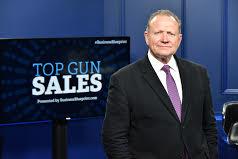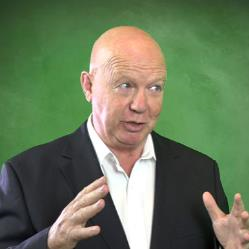 "Shorten selling time by getting to the real objection quickly" - Interview by John Smibert.
"Shorten selling time by getting to the real objection quickly" - Interview by John Smibert.
 In this interview the Top Gun sales coach Wayne Berry discusses customer objections and questions - that invariably arise during the sales process - and how to manage them.
In this interview the Top Gun sales coach Wayne Berry discusses customer objections and questions - that invariably arise during the sales process - and how to manage them.
Wayne sets the scene by saying; "really skilled salespeople get fewer sales objections that most salespeople. Why? Because they handle things upfront". In the interview Wayne explains how they do this this in more detail. However no matter how well we sell we will still get some objections - hidden or in the open - real or a smokescreen. We need to know how to draw them out and manage them to the satisfaction of the client. Wayne explains how.
Wayne's states that "the hardest objection to answer is the objection you never get out in the open". He explains what we need to do to identify the underlying objection and bring it into the open to be addressed. Again he gives us some pointers on how to do this.
Watch - and/or read - the full interview below.
Wayne Berry is the Top Gun Sales Guru and Coach and has authored 5 best selling books on selling.
Interview:
John: I'm with Wayne Berry again, Australia's top gun sales coach - welcome back, Wayne!
Wayne: Good to be here!
John: Wayne, last time we discussed negotiation, and I know you made the point to me since that we all need to learn how to negotiate, but we need to understand that it's very much creating the win-win, and it's really a life skill that we all should develop. Part of negotiation, or any time in the sales process, you get objections. I'd like to actually talk to the audience about how you think objections should be drawn out, managed, and so on.
Wayne: Okay, here's my observation. Really skilled salespeople get fewer objections that most salespeople. Why? Because they handle things upfront, they anticipate objections in advance, and answer them before they come up. They have a better process of getting to the point where they make some recommendations. So, they've understood the client's' needs, they understand their personal motivation; they've done all the things right.
John: So, if you've done everything right you're not going to get an objection?
Wayne: I won't say you won't get any objection, but you'll get far fewer objections than the average salesperson.
John: Far fewer, yes. I'm kidding you, but you're going to...
Wayne: I know. Yes, Absolutely. But, when you do get an objection... The hardest objection to answer, and this is particularly interesting I think, is the objection you never get out in the open. For example, somebody says "Look, thank you very much. I appreciate you spending the time with me. Leave it with me, and I'm going to think it over." Now, have you ever told a salesperson that, and did you really go home and think it over, think it over, think it over?
John: No. I've made a decision.
Wayne: You've made a decision, you just didn't want to tell the salesperson that. So, when somebody says to you "I want to think it over." they're not going to think it over. There are exceptions, some people will, certain behavioural styles that want to do that. Basically, there's an objection that is hidden. So, the hardest objection to answer is the objections the salesperson never gets to. How do you get to the real objection? Again, there's a strategy. There's a step by step process for getting past an excuse, getting to the real objection, and then simply showing the client that all they have is a question.
John: Right.
Wayne: They just have a question that they need answered, but they really didn't want to say to the salesperson.
John: They're too embarrassed to ask it, or they didn't want to expose themselves - whatever it is.
Wayne: See, often it's "I've got a cheaper price somewhere else." Or "I think it costs too much." or "I can't afford it." but they always say that. And again, it's not really a price issue, it's a value for money issue. If the salesperson hasn't explained the benefits in relation to the dollars it will always cost too much, but the prospect might simply say they want to think it over or whatever. If we can show the customer that all they really have is a question about value for money, and then "Do you mind if I answer that question?" and then answer it in a professional way, very often the client will say "Oh, okay. Now I understand."
Then the salesperson can move into a confirming sequence. Some of my clients use what we call the 'stair step' method for handling objections, get to the real objection so quickly, and they find that it shortens their selling time. Because they tell me "I've already gone on talking for another half an hour, and the guy's already decided not to buy, and I walk out with nothing! And suddenly I cut to the chase, I find out what the question is, I answer the question, and then I go in for a trial close again, and the guys say "Yeah, okay."
John: And if he doesn't buy it, at least you haven't wasted his or your time.
Wayne: Absolutely.
John: Yes.
Wayne: Handling objections is a skill, and like all skills it can be learnt, and it's such a vital skill to have. Because my experience is that the average salesperson gives up after one - not two, not three - one objection that stops them dead in their tracks, and it's all over. It's very sad.
John: Okay. So, that's the bottom line? To have the skill to handle an objection, but make sure you're managing the sales process early on. So you'll minimise the number of objections, but when you do make sure you draw it out; there'll be something hidden there more often than not.
Wayne: Yes, learn how to handle it effectively and professionally.
John: Wayne, thank you very much again!
Wayne: You're very welcome!
****************
More interviews with Wayne Berry:
***************

Your Invitation: I invite you to join the Sales Leader Forum group on LinkedIn where you can experience informative discussions with your peers and sales thought leaders on subjects like the one we have discussed here. I also invite you to subscribe to the
- Sales Leader Resource Centre here
- Sales Leader YouTube channel here (300+ sales leadership videos)
Please Share: If you valued this article, please share via your Twitter, LinkedIn, Google+ and Facebook social media platforms. I encourage you to join the conversation or ask questions. So feel free to add a comment on this post - I promise to respond. If inclined please follow my LinkedIn post page here.
Want to touch base? If you have questions please feel free to contact me - email: john.smibert(at)salesleaderforums.com, Phone: +61 404857893 or Skype: john.smibert